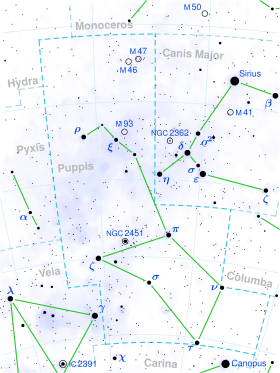16 Puppis
| Observation data Epoch J2000 Equinox J2000 | |
|---|---|
| Constellation | Puppis |
| Right ascension | 08h 09m 01.63741s[1] |
| Declination | −19° 14′ 42.0521″[1] |
| Apparent magnitude (V) | 4.40[2] |
| Characteristics | |
| Spectral type | B5 V[3] or B5 IV[4] |
| U−B color index | -0.60[5] |
| B−V color index | -0.15[5] |
| Astrometry | |
| Radial velocity (Rv) | +19.90[6] km/s |
| Proper motion (μ) | RA: −9.87[1] mas/yr Dec.: −5.55[1] mas/yr |
| Parallax (π) | 7.01 ± 0.22 mas[1] |
| Distance | 470 ± 10 ly (143 ± 4 pc) |
| Absolute magnitude (MV) | -1.37[2] |
| Details | |
| Luminosity | 836[2] L☉ |
| Surface gravity (log g) | 3.701[7] cgs |
| Temperature | 16,680[8] K |
| Rotational velocity (v sin i) | 140[9] or 185[10] km/s |
| Other designations | |
| Database references | |
| SIMBAD | data |
16 Puppis is a suspected astrometric binary[11] star system in the southern constellation of Puppis, and is located in the northernmost part of its constellation, almost due north of the bright star Rho Puppis, and east of Canis Major. It is visible to the naked eye as a faint, blue-white hued star with an apparent visual magnitude of 4.40.[2] The star is located is approximately 465 light years away from the Sun based on parallax.[1] It was the brightest star in Officina Typographica, an obsolete constellation.[12]
The visible member is a B-type main-sequence star with a stellar classification of B5 V,[3] according to N. Houk and M. Smith-Moore (1978). Earlier, Hoffleit et al. (1964) had listed a class of B5 IV,[4] suggesting a more evolved subgiant star. It is spinning rapidly, which is creating an equatorial bulge that is 6% larger than the polar radius.[10] The star is radiating 836[2] times the luminosity of the Sun from its photosphere at an effective temperature of 16,680 K.[8]
References[edit]
- ^ a b c d e f Van Leeuwen, F. (2007). "Validation of the new Hipparcos reduction". Astronomy and Astrophysics. 474 (2): 653–664. arXiv:0708.1752. Bibcode:2007A&A...474..653V. doi:10.1051/0004-6361:20078357. S2CID 18759600. Vizier catalog entry
- ^ a b c d e Anderson, E.; Francis, Ch. (2012). "XHIP: An extended hipparcos compilation". Astronomy Letters. 38 (5): 331. arXiv:1108.4971. Bibcode:2012AstL...38..331A. doi:10.1134/S1063773712050015. S2CID 119257644. Vizier catalog entry
- ^ a b Houk, Nancy; Smith-Moore, M. (1978). Michigan catalogue of two-dimensional spectral types for the HD stars. Vol. 4. Ann Arbor: Dept. of Astronomy, University of Michigan. Bibcode:1988mcts.book.....H.
- ^ a b Hoffleit, D.; Warren, W. H. (1995). "VizieR Online Data Catalog: Bright Star Catalogue, 5th Revised Ed. (Hoffleit+, 1991)". VizieR On-line Data Catalog: V/50. Originally Published in: 1964BS....C......0H. 5050. Bibcode:1995yCat.5050....0H.
- ^ a b Mallama, A. (2014). "Sloan Magnitudes for the Brightest Stars". The Journal of the American Association of Variable Star Observers. 42 (2): 443. Bibcode:2014JAVSO..42..443M.Vizier catalog entry
- ^ Gontcharov, G. A. (2006). "Pulkovo Compilation of Radial Velocities for 35 495 Hipparcos stars in a common system". Astronomy Letters. 32 (11): 759–771. arXiv:1606.08053. Bibcode:2006AstL...32..759G. doi:10.1134/S1063773706110065. S2CID 119231169.
- ^ Soubiran, Caroline; Le Campion, Jean-François; Brouillet, Nathalie; Chemin, Laurent (2016). "The PASTEL catalogue: 2016 version". Astronomy & Astrophysics. 591: A118. arXiv:1605.07384. Bibcode:2016A&A...591A.118S. doi:10.1051/0004-6361/201628497. S2CID 119258214.
- ^ a b Zorec, J.; Cidale, L.; Arias, M. L.; Frémat, Y.; Muratore, M. F.; Torres, A. F.; Martayan, C. (2009). "Fundamental parameters of B supergiants from the BCD system". Astronomy and Astrophysics. 501 (1): 297–320. arXiv:0903.5134. Bibcode:2009A&A...501..297Z. doi:10.1051/0004-6361/200811147. S2CID 14969137.
- ^ Abt, Helmut A.; Levato, Hugo; Grosso, Monica (2002). "Rotational Velocities of B Stars". The Astrophysical Journal. 573 (1): 359–365. Bibcode:2002ApJ...573..359A. doi:10.1086/340590.
- ^ a b van Belle, Gerard T. (March 2012). "Interferometric observations of rapidly rotating stars". The Astronomy and Astrophysics Review. 20 (1): 51. arXiv:1204.2572. Bibcode:2012A&ARv..20...51V. doi:10.1007/s00159-012-0051-2. S2CID 119273474.
- ^ Eggleton, P. P.; Tokovinin, A. A. (September 2008). "A catalogue of multiplicity among bright stellar systems". Monthly Notices of the Royal Astronomical Society. 389 (2): 869–879. arXiv:0806.2878. Bibcode:2008MNRAS.389..869E. doi:10.1111/j.1365-2966.2008.13596.x. S2CID 14878976.
- ^ Ian Ridpath's Star Tales - Officina Typographica

